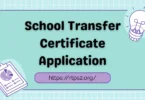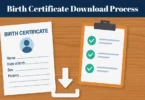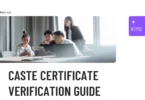Applying for a domicile certificate used to be a time-consuming and confusing task. Many people avoided it because they thought it was difficult. Today, however, it has become much simpler thanks to clear online and offline procedures. If you want to apply domicile certificate easily, you are in the right place.
In this detailed guide, we will explain everything from eligibility and documents required to step-by-step instructions, common mistakes to avoid, and even how to track your application. By the end, you will have all the knowledge needed to get your domicile certificate without stress.
What Is a Domicile Certificate?
A domicile certificate is an official document issued by the government that proves you are a permanent resident of a particular state or union territory.
It is often required for:
- Government jobs
- University admissions
- Scholarships
- Residential benefits
- Legal proof of residence
In simple words, it is your legal identity to show that you belong to a particular state or region.
Who Can Apply for a Domicile Certificate?
Not everyone can apply. The government sets rules to make sure the certificate is only given to eligible residents. You can apply if:
- You were born in the state
- You have lived in the state for a specific number of years (varies by state)
- Your parents or guardians are permanent residents of the state
- You own property or have a permanent address in the state
Each state has slightly different eligibility rules, so check your local government guidelines before applying.
Benefits of Having a Domicile Certificate
A domicile certificate can help you in many ways. Here are some key benefits:
- Education benefits: Get admission in state universities under local quotas.
- Job opportunities: Apply for government jobs with state quota benefits.
- Scholarships: Many scholarships require domicile proof.
- Legal proof: Acts as official proof of your permanent address.
- Government schemes: Needed to avail state-based welfare programs.
Documents Needed Before Applying
Before you apply, prepare the required documents. Missing documents can delay your application.
Commonly required documents include:
- Birth certificate
- School leaving certificate or mark sheet
- Proof of residence (electricity bill, water bill, ration card)
- Aadhaar card or voter ID
- Passport-sized photographs
- Affidavit (if required)
- Parents’ domicile certificate (if applicable)
Choose Your Application Method
You can apply for your domicile certificate in two ways:
- Online: Through your state’s official government portal
- Offline: By visiting the local district office, tehsildar’s office, or revenue department
If you want speed and convenience, online is usually better. But if you’re not comfortable with digital forms, the offline method works too.
Visit the Official Portal or Office
For Online Applications:
- Go to your state government’s official e-service portal.
- Look for “Apply for Domicile Certificate” in the services list.
- Create an account or log in if you already have one.
For Offline Applications:
- Visit your local tehsil or district collector’s office.
- Ask for the domicile certificate application form.
Fill in the Application Form Carefully
When filling the form:
- Write your full name exactly as in official documents.
- Enter your correct date of birth.
- Provide your permanent address clearly.
- Avoid spelling mistakes.
Even a small error can lead to rejection or delays.
Attach Required Documents
You must attach all supporting documents.
- Online: Scan and upload clear copies in the required file format (PDF, JPG, PNG).
- Offline: Attach self-attested photocopies along with the form.
Pay the Application Fee (If Any)
Some states charge a small fee (₹10 to ₹100).
Payment options:
- Online: Debit card, credit card, net banking, UPI
- Offline: Cash payment at the office counter
Submit Your Application
- Online: Click the final “Submit” button and note down the application number.
- Offline: Hand over the completed form and documents to the official.
Verification Process by Authorities
After submission, authorities will verify your details.
They may:
- Check your documents
- Visit your given address
- Cross-check with local records
Track Your Application Status
- Online: Use your application number on the portal to check status.
- Offline: Call or visit the office to ask about progress.
Receive Your Domicile Certificate
Once approved, you will receive your certificate:
- Online: Download the PDF or receive it via email.
- Offline: Collect it from the office.
Common Mistakes to Avoid While Applying
- Giving wrong or incomplete information
- Missing documents
- Uploading unclear or low-quality scans
- Forgetting to pay the fee
- Not checking the application status regularly
How to Renew or Update Your Domicile Certificate
If your personal details change (address, name, etc.), you must update your certificate. The process is similar to applying for a new one.
Domicile Certificate Rules and Validity
- Many states issue domicile certificates with lifetime validity.
- Some states require renewal after a few years.
- Rules differ by state, so always confirm locally.
Common FAQs About Apply Domicile Certificate Easily
Some faqs of Apply Domicile Certificate Easily:
1. How long does it take to get a domicile certificate?
Usually 7–15 working days, depending on the state.
2. Can I apply for a domicile certificate in a state where I work?
No, you must be a permanent resident to apply.
3. Is an Aadhaar card enough for domicile proof?
No, you still need the official domicile certificate.
4. What is the fee for applying?
It varies from state to state, usually ₹10–₹100.
5. Can students apply for a domicile certificate?
Yes, students can apply if they meet residency requirements.
6. Can I apply without my parents’ domicile certificate?
Yes, but you may need extra proof of residence.
7. What happens if my application is rejected?
You can reapply after correcting the mistakes.
8. Is the online method safe?
Yes, if you use the official government portal.
9. Can I have domicile certificates in two states?
No, it is illegal to hold domicile certificates for more than one state.
10. Do I need to be physically present for verification?
Sometimes yes, depending on the verification process.
Conclusion
Getting a domicile certificate is no longer a complicated process. If you follow the right steps, prepare your documents in advance, and avoid common mistakes, you can apply domicile certificate easily without unnecessary delays.
Whether you choose online or offline, the process is simple and clear. This small document can open doors to education, job opportunities, and government benefits, so apply today and secure your official proof of residence.







